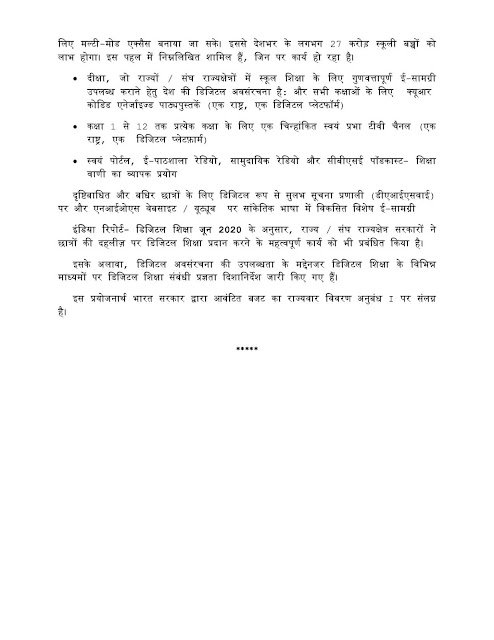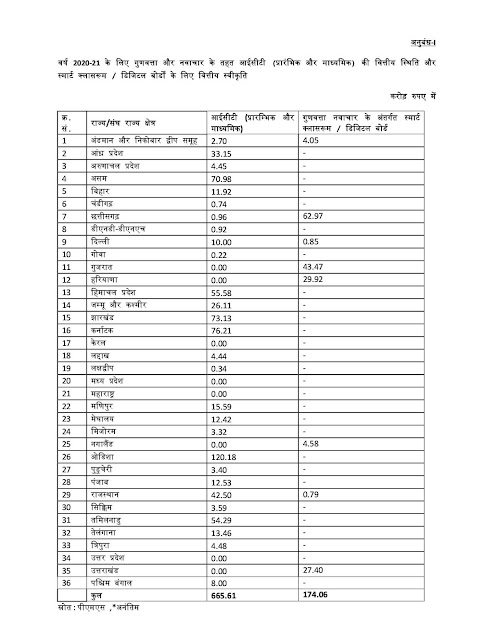ग्रामीण क्षेत्रों में शिक्षा योजनाएं
लोकसभा में ग्रामीण क्षेत्रों में शिक्षा योजनाओं के बारे में उठाये गए सवालों केंद्र सरकार की तरफ से जवाब देते हुए शिक्षा मंत्री श्री रमेश पोखरियाल “निशंक” ने बताया कि देश में ग्रामीण क्षेत्र में शिक्षा के विकास के लिए स्कूल शिक्षा की एकीकृत योजना – समग्र शिक्षा शुरू की गयी है, जो प्री-स्कूल से लेकर बारहवीं कक्षा तक का एक व्यापक कार्यक्रम है। इसका मुख्य उद्येश्य है स्कूल शिक्षा के सभी स्तरों पर समावेशी और सामान गुणवत्तायुक्त शिक्षा सुनिश्चित करना।
शिक्षा के बुनियादी ढाँचे में सुधार और ऑनलाइन शिक्षा और ऐप के लिए बनाई गयी कार्ययोजना और ऑनलाइन शिक्षा देने के लिए सरकार द्वारा क्या कदम उठाये गए हैं? इस पर शिक्षा मंत्री ने कहा कि सरकार ने पीएम ईविद्या नाम से एक पहल शुरू की है जिसमे डिजिटल / ऑनलाइन / ऑन एयर शिक्षा से सम्बंधित सभी प्रयास को एकीकृत किया गया है।
GOVERNMENT OF INDIA
MINISTRY OF Education
LOK SABHA
UNSTARRED QUESTION NO: 175
ANSWERED ON: 14.09.2020
Education Schemes in Rural Areas and EMRS
Devji Mansingram Patel
Sudhakar Tukaram Shrangre
Will the Minister of Education be pleased to state:-
(a) the details of the ongoing programmes, schemes and projects especially in rural areas in the country including Maharashtra and Rajasthan for spreading education;
(b) the action-plan formulated for basic educational infrastructure like smart Board, online education App in rural areas and to improve the quality of education being imported by the teachers in rural schools for the year 2020-2021 State-wise details of the budget allocated by the Government for this purpose;
(c) the steps taken to be taken by the Government to import online education to the students of all Government Schools?
MINISTER OF EDUCATION
(SHRI RAMESH POKHRIYAL ‘NISHANK’)
(a) The Government of India has launched Samagra Shiksha – an Integrated Scheme for school education, w.e.f. 2018-19, which is an overarching programme for the school education sector extending from pre-school to class XII and aims to ensure inclusive and equitable quality education at all levels of school education. It envisages the ‘school’ as a continuum from pre-school, primary, upper primary, secondary to senior secondary levels and susbsumes the three erstwhile centrally sponsored schemes i.e. Sarva Shiksha Abhiyan (SSA), Rashtriya Madhyamik Shiksha Abhiyan (RMSA) and Teacher Education (TE).
Bridging gender and social category gaps at all levels of school education is one of the major objectives of the scheme. The scheme reaches out to girls and children belonging to Scheduled Caste (SC), Scheduled Tribe (ST), minority communities and transgender. The scheme also gives attention to urban deprived children, children affected by periodic migration and children living in remote and scattered habitations. Under the scheme, provision has been made for giving preference to Special Focus Districts (SFDs), Educationally Backward Blocks (EEBs), LWE affected districts, and aspirational districts while planning interventions like setting up of primary schools, upper primary schools, construction of additional classrooms, toilets, Kasturba Gandhi Balika Vidyalayas (KGBVs).
(b) & (c) A comprehensive initiative called PM eVIDYA has been initiated which unifies all efforts related to digital/online/on-air education to enable multi-mode access to education. This will benefit nearly 27 crore school going children across the country. The initiative includes, where work is in progress.
- DIKSHA the nation’s digital infrastructure for providing quality e-content for school education in states/UTs: and QR coded Energized Textbooks for all grades (one nation, one digital platform)
- One earmarked TV channel in SWAYAM PRABHA per class from 1 to 12 (one class, one channel)
- SWAYAM Portal, E-PATHASHALA, extensive use of Radio, Community radio and CBSE Podcast- Shiksha Vani
- Special e-content for visually and hearing impaired developed on Digitally Accessible Information System (DAISY) and in sign language on NIOS website/ YouTube
As per INDIA REPORT- Digital Education June 2020, the State/ UT Governments have also managed the critical task of providing digital education at the door step of the students.
In addition, in view the availability of digital infrastructure, PRAGYATA Guidelines on Digital Education have been issued on various modes of digital education..
The State-wise details of the budget allocated by the Government of India for this purpose is annexed at Annexure I.
*****




